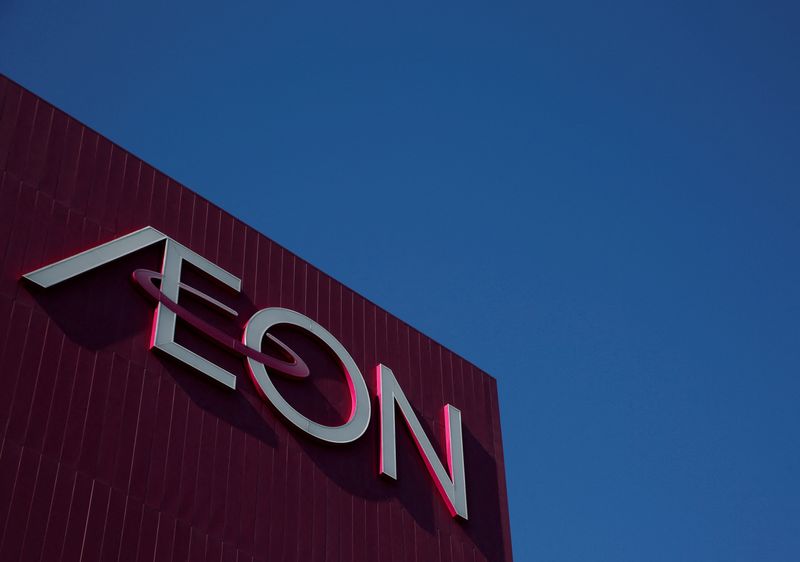By Makiko Yamazaki and Ritsuko Shimizu
TOKYO (Reuters) - As many Japanese firms bow to pressure from shareholders and regulators to end the practice of listing subsidiaries - which critics say compromises corporate governance - one of the country's biggest retailers isn't buying it.
Aeon Co Ltd, whose 15 listed subsidiaries include supermarkets and drugstores, said so-called parent-child listings improve, rather than hinder, governance.
"It's the most cost-effective way to strengthen management of our subsidiaries," Executive Officer Tsukasa Ojima told Reuters in a recent interview.
Listed firms must have higher disclosure standards and management is always under shareholder scrutiny, resulting in better quality management, said Ojima, a former Nomura Securities banker who joined Aeon last year.
The comments set Aeon apart from many other firms at a time when the government and Tokyo Stock Exchange (TSE) discourage such listings and are setting stricter governance requirements.
Listing a subsidiary was once a popular way in Japan for a listed parent to raise funds and maintain influence. But governance experts have long branded the practice as fundamentally unfair to minority shareholders, whose interests are inevitably subordinated to those of the parent.
Some investors say the potential for conflicts of interest dulls listed subsidiaries' valuations, whereas others like hedge funds target such firms in anticipation of buyouts or sales.
With growing criticism, particularly from abroad where such listings are rare, authorities have gradually cracked down on the practice. The screws tightened in April when the TSE reorganised its markets into three new tiers and began requiring listed subsidiaries to secure higher board independence or set up an independent special committee to remain in the top tier.
RE-THINK
With the increased regulatory scrutiny, the number of listed subsidiaries has roughly halved to 219 this year from a peak of 417 in 2007, showed data from Nomura Institute of Capital Markets Research.
In one example, Hitachi (OTC:HTHIY) Ltd divested or absorbed nearly all of its 22 listed subsidiaries over the last decade. Big names who continue to have listed subsidiaries include SoftBank Group Corp and Fujitsu Ltd.
More firms are likely to unwind parent-child listings as governance reform has forced a re-think of business portfolios and capital efficiency, said Hiroshi Yagi, who advises on capital strategy at Mizuho Trust & Banking.
"Many firms have kept their subsidiaries listed for purposes unrelated to their business portfolios, such as letting their units have the prestige of listed status or to lure top talent," said Yagi.
The revelation last month that Hino Motors Ltd had falsified emissions data for almost two decades highlighted what analysts called Toyota Motor (NYSE:TM) Corp's indecisive strategy over its listed truck and bus subsidiary, where they said Hino's half-hearted independence allowed ineffective governance.
The car maker acquired 50.1% of Hino in 2001 since when nearly all presidents have been from Toyota.
Toyota's chief communications officer, Jun Nagata, told reporters the automaker had created little synergy with Hino and a few years ago discussed ways to enhance ties, including the possibility of taking full ownership.
BUYOUT RISK
Aeon's Ojima said the retailer has safeguards to prevent potential issues associated with parent-child listings.
Each of its listed subsidiaries - including Aeon Mall Co Ltd, Maxvalu Tokai Co Ltd and Welcia Holdings Co Ltd - is run independently by experts in its field to achieve its own profit growth, while being able to tap resources at the parent such as customer data and brand power, Ojima said.
"If parents can be sure that the rights of listed subsidiaries' minority shareholders won't be sacrificed and can explain clear benefits, such listings probably don't have to be banned," said Waseda Business School professor Kazunori Suzuki.
No studies have so far shown that listed subsidiaries lag other firms in financial performance, Suzuki said.
"But we've seen so many shady cases in the past, where parents listed their subsidiaries out of need for cash and later re-absorbed them at prices lower than their initial offerings."

A group of institutional investors in a report last year said minority shareholders of listed subsidiaries are the most vulnerable in emergency situations such as buyouts.
"The parent can buy out the listed unit at a discount by taking advantage of its controlling shareholder status," the group said. "Concerns about such risks cannot be dispelled no matter how loudly the parent says it respects the subsidiary's independence."